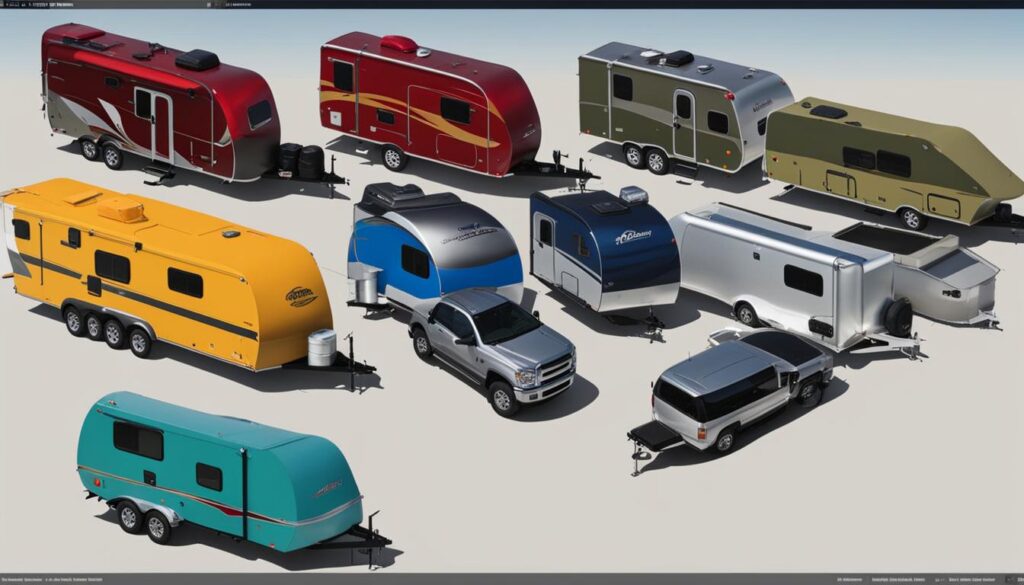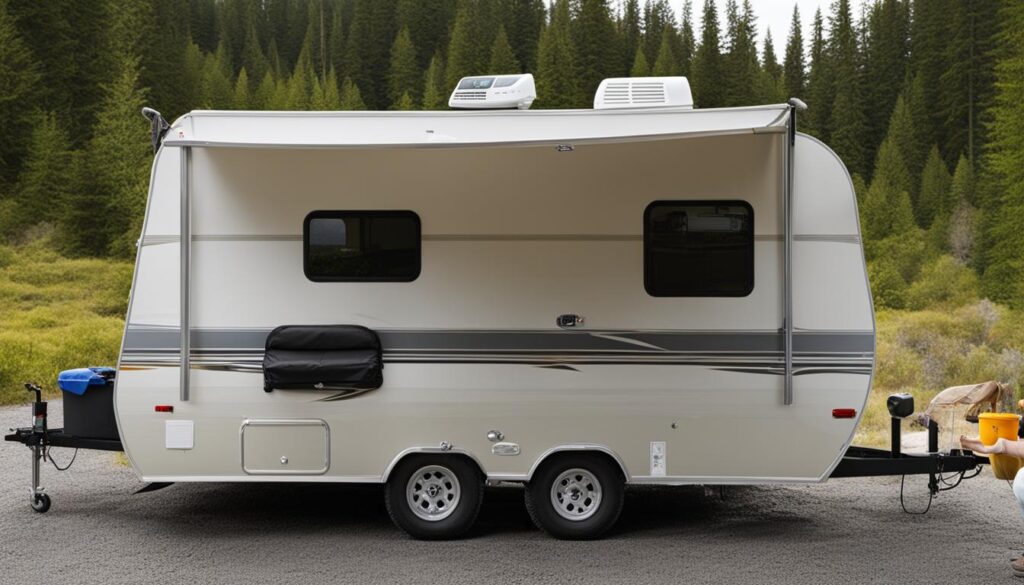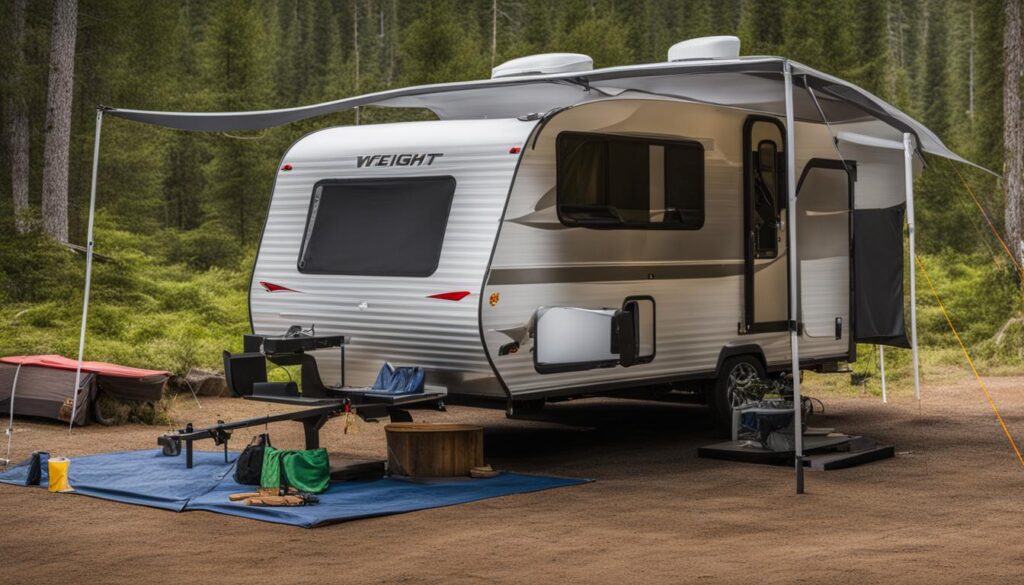When it comes to camping trailers, understanding their weight is of utmost importance. Knowing the weight ratings and specifications can help you make informed decisions when purchasing and towing a camping trailer. In this article, I will explain the various weight ratings, such as UVW, GVW, GVWR, CCC, GAWR, and tongue weight. I will also provide essential information on how to calculate and manage the weight of a camping trailer.
Key Takeaways:
- Understanding weight ratings is crucial for buying and towing a camping trailer.
- Weight ratings include UVW, GVW, GVWR, CCC, GAWR, and tongue weight.
- Properly managing the weight of a camping trailer ensures safe towing.
- Camping trailer weight can vary depending on size, type, and model.
- Weighing a camping trailer helps ensure it remains within weight limits.
Contents
RV Trailer Weight Ratings
Understanding RV trailer weight ratings is crucial for ensuring the safe and efficient operation of your camping trailer. These weight ratings play a significant role in determining the maximum weight that a camping trailer can safely carry, as well as the load distribution within the trailer. By understanding these ratings, you can choose a trailer that suits your towing vehicle’s capabilities and ensure that it is loaded within its recommended limits.
Key Weight Ratings for Trailers
There are several key weight ratings to consider when evaluating the weight capacity of a camping trailer:
- UVW (Unloaded Vehicle Weight): This refers to the weight of the trailer as it comes from the factory, including a full fuel tank and any optional equipment.
- GVW (Gross Vehicle Weight): Also known as the maximum loaded weight, this rating includes the weight of the trailer, plus any cargo, water, propane, and other items loaded inside.
- GVWR (Gross Vehicle Weight Rating): This is the maximum weight that the trailer can safely carry, including its own weight and the weight of any cargo.
- CCC (Cargo Carrying Capacity): This rating represents the maximum weight of cargo and passengers that can be carried by the trailer.
- GAWR (Gross Axle Weight Rating): This refers to the maximum weight that each axle of the trailer can support.
- Tongue Weight: This is the downward force exerted on the hitch ball by the trailer’s tongue. It is crucial to ensure that the tongue weight falls within the recommended range to maintain stability while towing.
By understanding these weight ratings, you can make informed decisions about the weight limits of various campers and ensure that you load and tow your trailer safely and efficiently.

Weight Ratings for Tow Vehicles
When it comes to towing a camping trailer, it’s important to understand the weight ratings for your tow vehicle. These ratings will help you determine the appropriate camping trailer that can be safely towed. Let’s take a closer look at the key weight ratings for tow vehicles: curb weight, max tow capacity, and tongue weight capacity.
Curb Weight
The curb weight refers to the weight of the tow vehicle without any additional load, such as passengers or cargo. It provides a baseline measurement to understand the vehicle’s towing capabilities. To find the curb weight, you can refer to your vehicle’s owner’s manual or check the manufacturer’s specifications.
Max Tow Capacity
The max tow capacity indicates the maximum weight that the tow vehicle can safely tow. It takes into account factors like engine power, transmission, suspension, and braking capabilities. Exceeding the max tow capacity can put unnecessary strain on the vehicle and compromise safety. To find the max tow capacity, consult your vehicle’s manual or contact the manufacturer.
Tongue Weight Capacity
The tongue weight capacity refers to the maximum weight that the tow vehicle’s rear suspension can handle. It is the downward force exerted on the hitch ball by the tongue of the camping trailer. Exceeding the tongue weight capacity can negatively impact the vehicle’s handling and stability. To determine the tongue weight capacity, check your vehicle’s owner’s manual or consult a professional.
Understanding these weight ratings for your tow vehicle is crucial for selecting a camping trailer that falls within its towing capabilities. Overloading a tow vehicle can lead to poor performance, increased wear and tear, and potential safety hazards. It’s always recommended to stay within the specified weight limits to ensure a safe and enjoyable towing experience.
| Weight Rating | Brief Description |
|---|---|
| Curb Weight | The weight of the tow vehicle without any additional load |
| Max Tow Capacity | The maximum weight that the tow vehicle can safely tow |
| Tongue Weight Capacity | The maximum weight that the tow vehicle’s rear suspension can handle |
Average Camping Trailer Weights
When it comes to camping trailers, one of the crucial factors to consider is their weight. The weight of camping trailers can vary significantly depending on their type and model. Let’s take a closer look at the average weights of different types of camping trailers:
- Travel Trailers: On average, travel trailers weigh around 5,200 pounds. These trailers are a popular choice among campers due to their versatility and ease of towing.
- Lightweight Fifth Wheels: Lightweight fifth wheels are designed to be more compact and lightweight than their larger counterparts. These trailers typically weigh between 2,400 and 9,000 pounds, making them an excellent option for campers who prefer a lighter load.
- Mid-sized Fifth Wheels: Mid-sized fifth wheels offer a balance between size and weight. These trailers typically weigh between 9,000 and 14,000 pounds, providing ample space for amenities without compromising on towing capabilities.
- Full-sized Fifth Wheels: Full-sized fifth wheels offer spacious living areas and are ideal for long-term camping. These trailers can weigh anywhere from 11,000 to 22,000 pounds, requiring a robust tow vehicle to handle the load.
- Toy Hauler Fifth Wheels: Toy hauler fifth wheels are designed for campers who want to bring along their recreational vehicles or other large equipment. These trailers have a weight range of 10,000 to 16,500 pounds, providing the capacity to carry both living space and toys.
Choosing the right camping trailer that matches your tow vehicle’s capabilities is essential to ensure safe and comfortable travels. Consider the average weights of different trailer types and select one that suits your needs without exceeding your vehicle’s towing capacity.

When considering the weight of a camping trailer, it’s also important to remember that the weights mentioned above are averages and can vary depending on specific brands and models. Always refer to the manufacturer’s specifications and consult with a knowledgeable professional to ensure you choose the right camping trailer for your adventures.
Factors Affecting Camping Trailer Weight
The weight of a camping trailer can be influenced by several factors. Understanding these factors can help you estimate the weight of a camping trailer and make informed choices when selecting a trailer that meets your needs and is within the towing capacity of your vehicle.
Size and Construction Materials
The size and construction materials of the trailer play a significant role in determining its weight. Larger trailers generally weigh more due to the additional materials used in their construction. Similarly, trailers made from heavier materials, such as steel, will be heavier compared to trailers made from lighter materials, such as aluminum or fiberglass.
Slide-Outs
Slide-outs are additional sections of a camping trailer that can be extended to create more interior space. While slide-outs offer increased living space, they also add to the overall weight of the trailer. The number and size of slide-outs should be considered when estimating the weight of a camping trailer.
Appliances and Amenities
The type and number of appliances and amenities installed in a camping trailer can significantly impact its weight. Features such as air conditioning units, kitchen appliances, entertainment systems, and elaborate bathroom fixtures can add substantial weight to the trailer. Consider the necessity of these amenities and their weight implications when choosing a camping trailer.
Holding Tanks
Camping trailers often have holding tanks for water and waste. The amount of water in these tanks can contribute to the overall weight of the trailer. The weight of full water tanks should be factored in when estimating the weight of a camping trailer.
Cargo and Personal Belongings
The weight of cargo and personal belongings loaded into a camping trailer can significantly impact its overall weight. It is important to consider the weight of items such as clothing, food, camping gear, and other essentials when estimating the trailer’s weight. Packing only necessary items and avoiding excessive cargo can help keep the trailer’s weight within acceptable limits.
| Factors Affecting Camping Trailer Weight |
|---|
| Size and Construction Materials |
| Slide-Outs |
| Appliances and Amenities |
| Holding Tanks |
| Cargo and Personal Belongings |
Weighing a Camping Trailer
Weighing a camping trailer is a crucial step to ensure safe towing and proper weight distribution. There are two primary methods to measure the weight of a camping trailer: using a commercial scale or utilizing wheel position weighing.
Commercial Scale Weighing
One of the most common and accurate ways to weigh a camping trailer is by using a commercial scale, such as CAT scales, which can be found at truck stops. These scales provide comprehensive measurements of the entire trailer’s weight, including the tongue weight.
Here’s how to weigh a camping trailer using a commercial scale:
- Park your towing vehicle and camping trailer on the scale.
- Ensure that the trailer is hitched properly to the towing vehicle.
- Obtain the weight measurement from the scale, which will include the trailer’s UVW (Unloaded Vehicle Weight) and any additional cargo.
Using a commercial scale is an effective method to get accurate weight measurements, allowing you to assess whether your camping trailer is within its weight limits and adjust your cargo if necessary.
Wheel Position Weighing
Another method to weigh a camping trailer is through wheel position weighing, which involves measuring the weight of each wheel separately. This method helps ensure proper load distribution and balance.
To weigh a camping trailer using wheel position weighing:
- Purchase a set of portable wheel scales or utilize a truck scale with multiple platforms.
- Drive each wheel of the camping trailer onto the scales one at a time.
- Record the weight measurement for each wheel.
- Calculate the total weight by summing up the individual wheel weights.
Wheel position weighing provides accurate data on weight distribution, allowing you to adjust cargo placement within the trailer to optimize stability and safe towing.

By weighing your camping trailer, you can ensure that it remains within its weight limits, preventing excessive wear and tear on your towing vehicle and ensuring safe travels.
Tips for Managing Camping Trailer Weight
Managing the weight of your camping trailer is essential for ensuring a safe and enjoyable travel experience. Here are some helpful tips to effectively manage the weight:
1. Pack only essential items: Before hitting the road, carefully consider what you truly need for your camping trip. By packing only the essentials, you can significantly reduce the overall weight of your trailer.
2. Distribute weight evenly: Proper weight distribution is crucial for maintaining stability while towing. Make sure to evenly distribute the weight throughout the trailer, placing heavier items over the trailer’s axle and avoiding excessive weight on one side.
3. Avoid excessive water and fuel storage: Water and fuel can add significant weight to your trailer. Only carry the amount of water and fuel that you absolutely need for your trip, and consider refilling them as necessary along the way to avoid unnecessary weight.
4. Periodically weigh the trailer: Regularly weighing your trailer, whether at a commercial scale or using wheel position weighing, will help you ensure that it remains within its weight limits. This will allow you to make any necessary adjustments to ensure safe towing.
5. Regularly check weight ratings: It’s important to regularly check the weight of cargo, appliances, and other items added to the trailer to ensure they do not exceed the weight ratings. By staying within the recommended limits, you can ensure a smooth and safe towing experience.
By following these tips, you can effectively manage the weight of your camping trailer and have peace of mind during your travels. Safe towing!
FAQ
How much does a camping trailer weigh?
The weight of a camping trailer can vary depending on the type and model. On average, travel trailers weigh around 5,200 pounds, while lightweight fifth wheels can range from 2,400 to 9,000 pounds. Mid-sized fifth wheels typically weigh between 9,000 and 14,000 pounds, while full-sized fifth wheels can weigh from 11,000 to 22,000 pounds. Toy hauler fifth wheels have a weight range of 10,000 to 16,500 pounds.
What are the weight ratings for camping trailers?
Key weight ratings for camping trailers include UVW (Unloaded Vehicle Weight), GVW (Gross Vehicle Weight), GVWR (Gross Vehicle Weight Rating), CCC (Cargo Carrying Capacity), GAWR (Gross Axle Weight Rating), and tongue weight. These ratings dictate the maximum weight a camping trailer can safely carry and the load distribution within the trailer.
What weight ratings do I need to consider for my tow vehicle?
When choosing a camping trailer, it is important to consider the weight ratings for your tow vehicle. These ratings include curb weight, max tow capacity, and tongue weight capacity. Curb weight refers to the weight of the tow vehicle without any additional load. Max tow capacity indicates the maximum weight that the tow vehicle can safely tow. Tongue weight capacity refers to the maximum weight that the tow vehicle’s rear suspension can handle.
What factors can affect the weight of a camping trailer?
The weight of a camping trailer can be influenced by factors such as the size and construction materials of the trailer, the number and size of slide-outs, the type of appliances and amenities installed, the amount of water in the holding tanks, and the cargo and personal belongings loaded in the trailer.
How can I weigh a camping trailer?
There are different methods to weigh a camping trailer, such as using a commercial scale or using wheel position weighing. Commercial scales, like CAT scales, are commonly found at truck stops and provide accurate and comprehensive weight measurements for the entire trailer. Wheel position weighing involves measuring the weight of each wheel separately to ensure proper load distribution.
How can I manage the weight of my camping trailer?
To effectively manage the weight of your camping trailer, consider packing only essential items, distributing the weight evenly throughout the trailer, avoiding excessive water and fuel storage, and periodically weighing the trailer to ensure it remains within its weight limits. It is also important to regularly check the weight of cargo, appliances, and other items added to the trailer to ensure they do not exceed the weight ratings.






